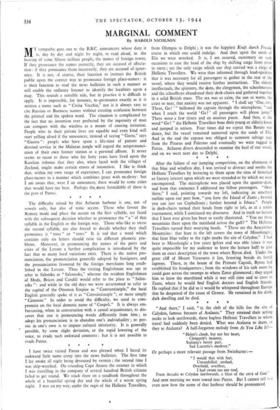MARGINAL COMMENT
By HAROLD NICOLSON
Y sympathy goes out to the B.B.C. announcers whose duty it lrl is, day by day and night by night, to read aloud, in the hearing of some fifteen million people, the names of foreign towns. If they pronounce the names correctly, they are accused of affecta- tion: if they pronounce them incorrectly, they are accused of .ignor- ance. It is not, of course, their function to instruct the British public upon the correct way to pronounce foreign place-names: it is their function to read the news bulletins in such a manner as will enable the ordinary listener to identify the localities upon a map. This sounds a sensible rule, but in practice it is difficult to apply. It is impossible, for instance, to-pronounce exactly as it is written a name such as " Civita Vecchia," nor is it always easy to cite Russian or Burmese names without creating confusion between the printed and the spoken word. The situation is complicated by the fact that no invention ever perfected by the ingenuity of man can compare with the wireless as a means of causing irritation. People who in their private lives are equable and even kind will start yelling aloud if the announcer, instead of saying " Gaeta," says " Gaeeta ": people who have spent a life-time of patient and devoted service in the Malayan jungle will regard the mispronunci- ation of their own former station as a personal affront. It never seems to occur to those who for forty years have lived upon the Karelian isthmus that they also, when faced with the villages of Zeeland, might make certain errors of intonation. I like to think that, within my own range of experience, I can pronounce foreign place-names in a manner which combines grace with modesty : but I am aware that, were I an announcer, there would be some cities that would have me beat. Perhaps the most formidable of these is the port of Patras.


























 Previous page
Previous page